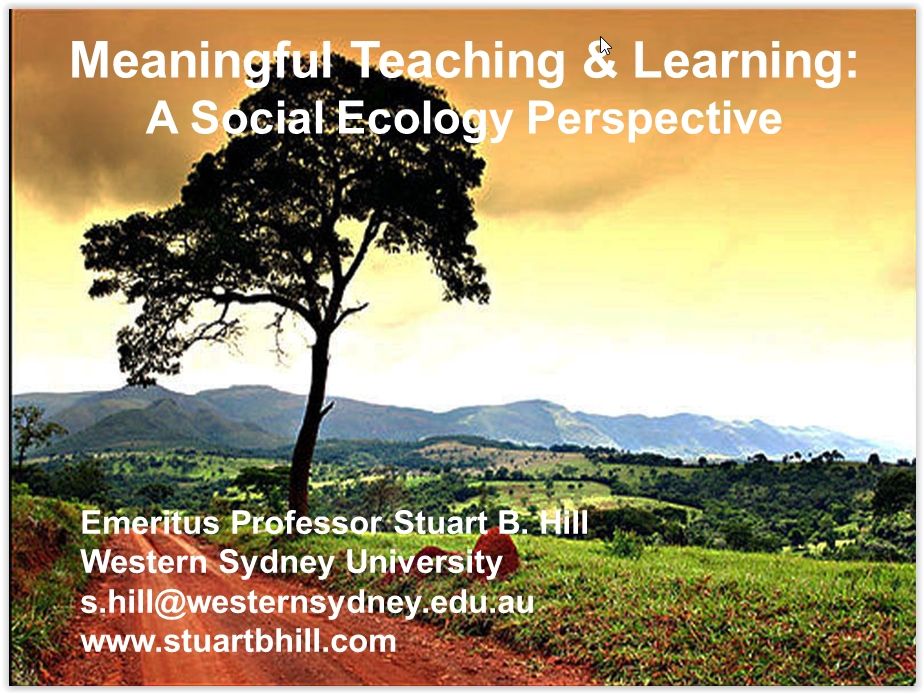Click to download Powerpoint presentation (29.9mb)
Social Ecology for Educators
Meaningful Teaching & Learning: A Social Ecology Perspective – 2016 – Penrith – UG Social Ecology, Western Sydney University
This session will focus on developing and working with an ‘ecological consciousness’ … implications for choices and priorities day-to-day in work place, community and relationship/family settings. This will involve considering the processes involved, including active/empathic listening, communication, collaboration, working with complexity, a radical approach to visioning (based on ‘lying’!), deep leadership and ways to manage associated resistance, conflict, celebration, active reflection …examples of doing this in communities and in one’s life; including issues involving power, gender, difference, design to prevent (rather that solutions to solve) ‘problems’ (consider as’ indicators’, not ‘enemies’!) - All based on a foundational understanding of knowledge, wisdom, psychology, ecology, social ecology, transformational learning, development and change; followed by workshop activities to personalise the participants’ learning and commitment.
Implications for choices and priorities day-to-day:
- in work place,
- community,
- relationship/family settings.
This will involve considering the processes involved, including:
- active/empathic listening,
- communication,
- collaboration,
- working with complexity,
- a radical approach to visioning (based on ‘lying’!),
- deep leadership
ways to manage associated:
- resistance,
- conflict,
- celebration,
- active reflection …
examples of doing this in:
- communities,
- one’s life
including issues involving:
- power,
- gender,
- difference,
- design to prevent (rather that solutions to solve) ‘problems’ (consider as’ indicators’, not ‘enemies’!)
All based on a foundational understanding of:
- knowledge,
- wisdom,
- psychology,
- ecology,
- social ecology,
- transformational learning,
- development,
- change
Followed by workshop activities to personalise the participants’ learning and commitment.
TESTING QUESTIONS FOR ‘GENUINE’ PROGRESS & IMPROVEMENT - To what extent, and in what ways, do the initiatives (policies, programmes, plans, regulations, decisions, initiatives, etc.) support the sustainable wellbeing of all, in relation to the following four main areas?
Personal considerations
- Building and maintaining personal capital – personal sustainability: empowerment, awareness, creative visioning, values and worldview clarification, acquisition of essential literacies and competencies, responsibility, wellbeing and health maintenance, vitality and spontaneity?
- Home and ecosystem maintenance: caring, loving, responsible, mutualistic, negentropic (capital building) relationships with diverse others (valuing equity & social justice), other species, place and planet? [‘negentropic’ is the opposite of ‘entropic’: breaking down]
- Lifelong learning: positive total life-cycle personal development and ‘progressive’ change?
Socio-political considerations
- Building and maintaining social capital – cultural [including economic] sustainability: trust, accessible, collaborative, responsible, creative, celebrational, life-promoting community and political structures and processes?
- Inter-cultural and interpersonal capital: the valuing of ‘functional’ high cultural diversity, mutually beneficial relationships and the required competencies?
- Co-evolutionary change: positive cultural development and co-evolutionary change that benefits all involved?
Environmental considerations
- Building and maintaining natural capital: effective ecosystem functioning, resilience and ecological sustainability?
- ‘Functional’ high biodiversity, and prioritised use and conservation of resources?
- Positive ecosystem development and co-evolutionary change?
General considerations
- Proactive (vs. reactive) design/redesign (vs. just efficiency & substitution) and small meaningful collaborative initiatives that one can guarantee to carry through to completion (vs. heroic, Olympic-scale, exclusive, high-risk ones), and public celebration at each stage – to facilitate the spread of initiatives – thereby making wellbeing and environmental caring ‘contagious’?
- A focus on key opportunities and windows for change (contextually unique change ‘moments’ & places)?
- Effective evaluation and monitoring: (broad, long-term, as well as specific & short-term) by identifying and using integrator indicators and testing questions, and by being attentive to all feedback and outcomes (& redesigning future actions & initiatives accordingly)?


